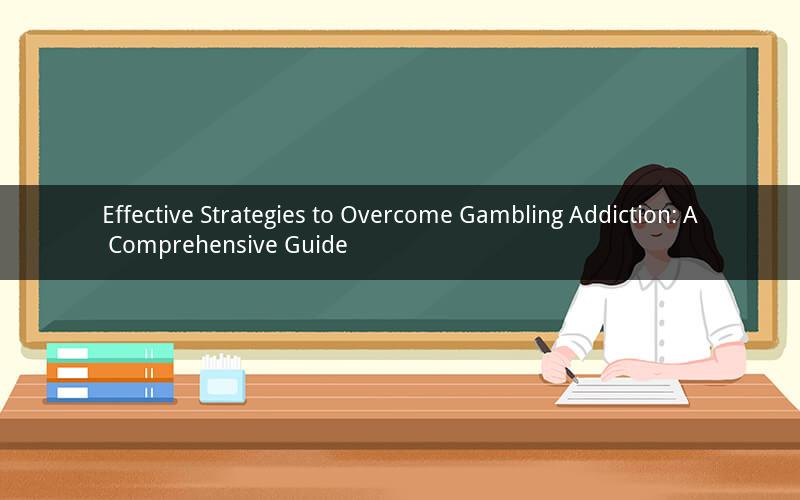
Introduction:
Gambling addiction is a complex issue that affects millions of individuals worldwide. It is crucial to understand how to stop gambling addiction and seek help to break free from this destructive behavior. This article provides a detailed guide on effective strategies to overcome gambling addiction and regain control over one's life.
1. Recognize the Signs of Gambling Addiction:
Identifying the signs of gambling addiction is the first step towards overcoming it. Common signs include:
a) Inability to control gambling behavior: Feeling an urge to gamble continuously, despite negative consequences.
b) Increasing amounts of money or time spent on gambling: Needing to bet more money or time to achieve the same level of excitement.
c) Preoccupation with gambling: Constantly thinking about gambling, planning the next betting session, or reliving past gambling experiences.
d) Ignoring responsibilities: Neglecting personal, family, and professional obligations due to gambling.
e) Financial problems: Borrowing money, lying about gambling, or experiencing financial ruin.
2. Seek Professional Help:
Professional help is essential in overcoming gambling addiction. Here are some options:
a) Therapists: Cognitive-behavioral therapy (CBT) is an effective treatment for gambling addiction. A therapist can help individuals identify and change negative thoughts and behaviors associated with gambling.
b) Support groups: Joining a support group, such as Gamblers Anonymous, can provide a sense of community and understanding from others who have experienced similar struggles.
c) Inpatient or outpatient treatment programs: These programs offer structured support and treatment for individuals with severe gambling addiction.
3. Develop a Support System:
Creating a support system is crucial in overcoming gambling addiction. Here are some ways to build a supportive network:
a) Family and friends: Communicate with loved ones about your struggles and seek their support. They can provide emotional support and hold you accountable.
b) Support groups: Engaging with others who understand your situation can provide comfort and practical advice.
c) Mental health professionals: Regular check-ins with a therapist or counselor can help maintain progress and address any challenges that arise.
4. Identify Triggers and Avoid Them:
Identifying triggers that prompt gambling behavior is crucial in preventing relapse. Common triggers include:
a) Emotional stress: Gambling can be a way to cope with stress, anxiety, or depression. Find healthier coping mechanisms, such as exercise, meditation, or hobbies.
b) Social situations: Avoiding places or activities that trigger gambling cravings is essential. If certain social situations are problematic, consider attending events with a supportive friend or family member.
c) Advertising: Be mindful of gambling advertisements and avoid places with gambling promotions.
5. Create a Financial Plan:
Developing a financial plan is essential to address the financial consequences of gambling addiction. Consider the following steps:
a) Set a budget: Establish a realistic budget and stick to it. Allocate funds for necessary expenses, savings, and entertainment without resorting to gambling.
b) Pay off debts: Prioritize paying off debts incurred due to gambling. Consider seeking assistance from credit counseling services.
c) Monitor spending: Keep track of your finances to identify patterns and make adjustments as needed.
6. Practice Self-Compassion:
Overcoming gambling addiction can be challenging, and setbacks are inevitable. Practice self-compassion by being kind to yourself during the recovery process. Remember that it takes time and effort to break free from addiction.
Frequently Asked Questions:
1. What is the most effective treatment for gambling addiction?
Answer: Cognitive-behavioral therapy (CBT) is considered the most effective treatment for gambling addiction. It helps individuals identify and change negative thoughts and behaviors associated with gambling.
2. Can I overcome gambling addiction on my own?
Answer: While some individuals may find success in overcoming gambling addiction independently, seeking professional help and joining support groups can significantly improve the chances of recovery.
3. How long does it take to overcome gambling addiction?
Answer: The duration of recovery varies for each individual. Some may experience significant progress within a few months, while others may require ongoing treatment and support for years.
4. Can medication help with gambling addiction?
Answer: Medication is not typically used as a primary treatment for gambling addiction. However, some individuals may benefit from medications that address underlying mental health conditions, such as depression or anxiety.
5. What can I do if I relapse during my recovery journey?
Answer: If you experience a relapse, it is crucial to seek support from friends, family, or professionals. Reflect on the triggers and challenges that led to the relapse and develop strategies to prevent future setbacks. Remember that relapse is a part of the recovery process, and it is essential to stay committed to your goals.